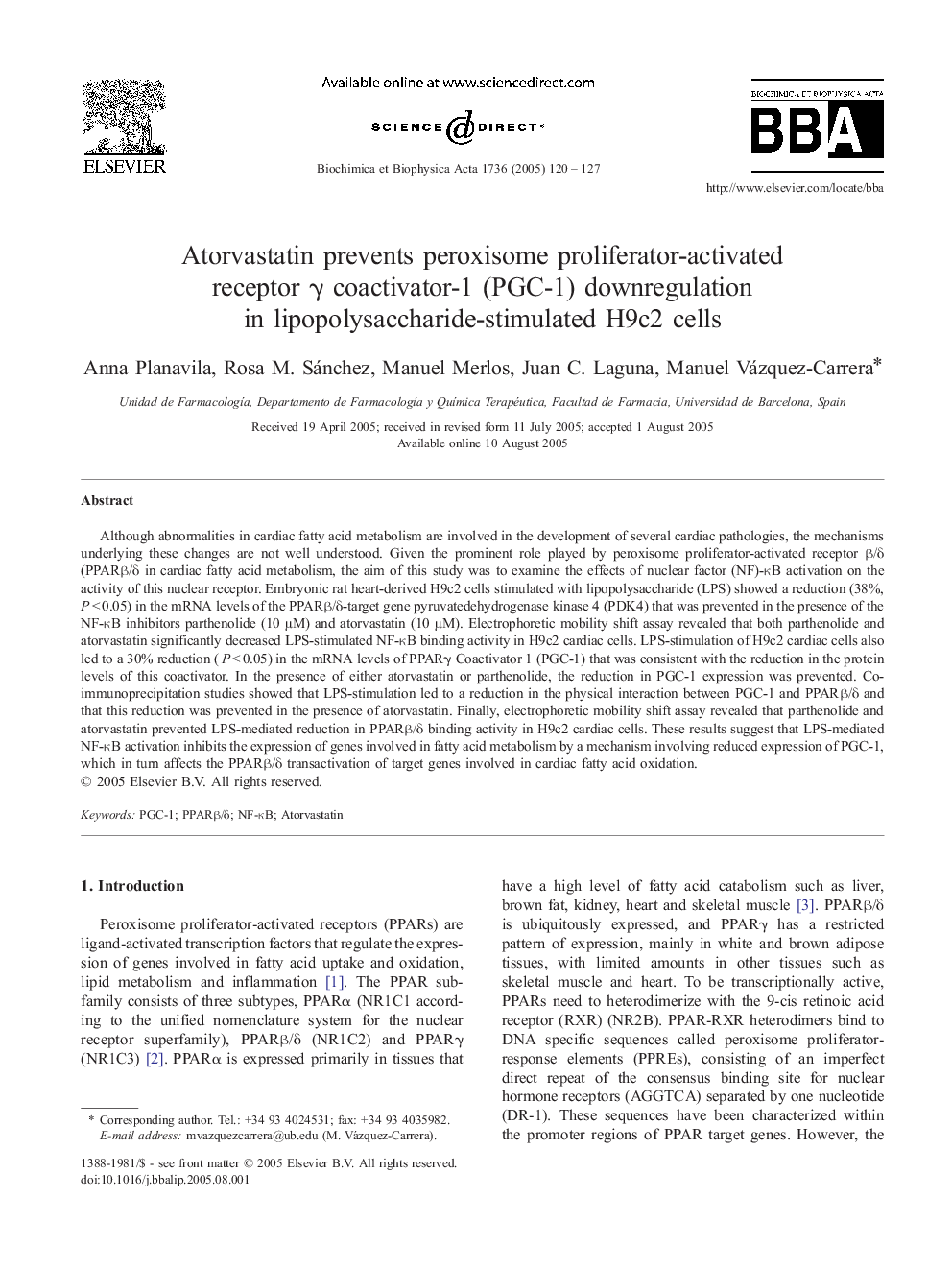| کد مقاله | کد نشریه | سال انتشار | مقاله انگلیسی | نسخه تمام متن |
|---|---|---|---|---|
| 9886511 | 1537830 | 2005 | 8 صفحه PDF | دانلود رایگان |
عنوان انگلیسی مقاله ISI
Atorvastatin prevents peroxisome proliferator-activated receptor γ coactivator-1 (PGC-1) downregulation in lipopolysaccharide-stimulated H9c2 cells
دانلود مقاله + سفارش ترجمه
دانلود مقاله ISI انگلیسی
رایگان برای ایرانیان
موضوعات مرتبط
علوم زیستی و بیوفناوری
بیوشیمی، ژنتیک و زیست شناسی مولکولی
زیست شیمی
پیش نمایش صفحه اول مقاله

چکیده انگلیسی
Although abnormalities in cardiac fatty acid metabolism are involved in the development of several cardiac pathologies, the mechanisms underlying these changes are not well understood. Given the prominent role played by peroxisome proliferator-activated receptor β/δ (PPARβ/δ in cardiac fatty acid metabolism, the aim of this study was to examine the effects of nuclear factor (NF)-κB activation on the activity of this nuclear receptor. Embryonic rat heart-derived H9c2 cells stimulated with lipopolysaccharide (LPS) showed a reduction (38%, P < 0.05) in the mRNA levels of the PPARβ/δ-target gene pyruvatedehydrogenase kinase 4 (PDK4) that was prevented in the presence of the NF-κB inhibitors parthenolide (10 μM) and atorvastatin (10 μM). Electrophoretic mobility shift assay revealed that both parthenolide and atorvastatin significantly decreased LPS-stimulated NF-κB binding activity in H9c2 cardiac cells. LPS-stimulation of H9c2 cardiac cells also led to a 30% reduction (P < 0.05) in the mRNA levels of PPARγ Coactivator 1 (PGC-1) that was consistent with the reduction in the protein levels of this coactivator. In the presence of either atorvastatin or parthenolide, the reduction in PGC-1 expression was prevented. Co-immunoprecipitation studies showed that LPS-stimulation led to a reduction in the physical interaction between PGC-1 and PPARβ/δ and that this reduction was prevented in the presence of atorvastatin. Finally, electrophoretic mobility shift assay revealed that parthenolide and atorvastatin prevented LPS-mediated reduction in PPARβ/δ binding activity in H9c2 cardiac cells. These results suggest that LPS-mediated NF-κB activation inhibits the expression of genes involved in fatty acid metabolism by a mechanism involving reduced expression of PGC-1, which in turn affects the PPARβ/δ transactivation of target genes involved in cardiac fatty acid oxidation.
ناشر
Database: Elsevier - ScienceDirect (ساینس دایرکت)
Journal: Biochimica et Biophysica Acta (BBA) - Molecular and Cell Biology of Lipids - Volume 1736, Issue 2, 15 September 2005, Pages 120-127
Journal: Biochimica et Biophysica Acta (BBA) - Molecular and Cell Biology of Lipids - Volume 1736, Issue 2, 15 September 2005, Pages 120-127
نویسندگان
Anna Planavila, Rosa M. Sánchez, Manuel Merlos, Juan C. Laguna, Manuel Vázquez-Carrera,